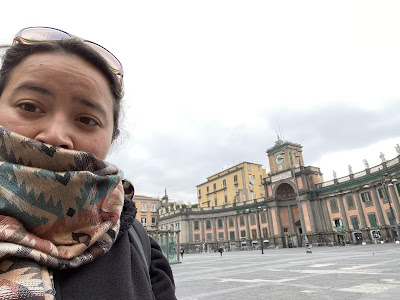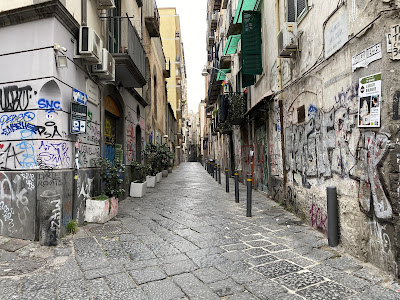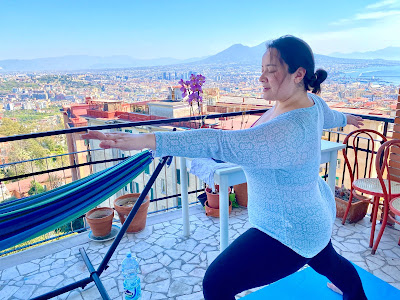Coronavirus & Life Under a Lockdown (Naples, Italy)
Thank you to all those who have sent messages this past week. Many of you have various questions as to how we are, what the situation is regarding coronavirus in Italy, and what it is like living under a lockdown. I’ve written to many of you individually, but for those of you who are interested or have asked for more information, here you go:
First of all, here is a timeline (American perspective of events in/concerning Italy)
February 7 - US embassy sends health alert on COVID-19, and advises citizens to be prepared for travel restrictions put in place with little or no warning.
February 21 - US Embassy sends health alert for Lombardy and Veneto; Italy closes public schools and offices in affected areas; recommended to avoid public spaces.
February 23 - Reduced staffing at consulate in Milan.
February 26 - US raises Italy to a level 2: exercise increased caution due to recent outbreak of COVID-19.
February 28 - US raises Italy to a level 3: reconsider travel due to a recent outbreak of COVID-19; Vietnam subjects passengers arriving from South Korea, Italy, and Iran, and those who have been in the aforementioned countries in the past 14 days to intensive screening, and possible quarantine or return to point of departure.
February 29 - US keeps all of Italy at a level 3: reconsider travel, except Veneto & Lombardy, which are raised to level 4: do not travel.
March 4 - Italy implements enhanced screening and quarantine measures to reduce the spread of COVID-19. All passengers on US-bound flights with a temperature above 99.5 degrees F are not permitted to board.
March 8 - Italy forbids all non-essential travel to/from specific regions including provinces in Lombardy, Veneto, Piemonte, Emilia Romagna, and Marche through April 3. Nationwide restrictions on large gatherings and civil or religious ceremonies, and closures for schools, gyms and swimming pools, theaters, museums, and cultural centers.
March 9 - Italian government prohibits movement in public places except for justifiable reasons (i.e. work), basic necessities (i.e. groceries), and health emergencies. Sporting events and public gatherings canceled, and schools, universities, and recreational facilities closed through April 3. Bars and restaurants open from 6am-6pm.
March 11 - Only emergency American citizen and visa services available at the Rome Embassy and Consulates throughout Italy. US places travel restrictions on EU countries and issues a global health advisory and level 3 for all countries urging citizens to reconsider travel abroad at this time due to the global impact of COVID-19. Italian government imposes stricter rules, stating only necessary services/stores will be available/open (grocery stores, gas stations, pharmacies, etc.); restaurants and bars closed. Anyone leaving their residence must have a self-declaration form stating the reason for travel; check-points will be in place to enforce. World Health Organization determines COVID-19 outbreak constitutes a pandemic.
________
My personal experience
On Sunday, March 8 we read that certain “red zones” in the north were being locked down. We heard of people fleeing to the south, and quite honestly there was some fear that a mass exodus from the north would lead to higher infection rates in the south.
On Monday, March 9 I went to school and everything felt different. It seemed quieter and there was an eery feeling in the air. The metro had fewer people, more people were wearing face masks, and everyone was hesitant to interact or come in close contact with others. I had to do my lesson at a cafe one meter away from my teacher instead of in a classroom where we often sit side-by-side. A friend saw me, kept her distance, and said we could no longer hug each other.
After my lesson I headed to the train station to cancel some tickets (we were supposed to head to Padua Thursday). On the way, I sent my friend a message saying I was walking to the station to enjoy the sun, because who knows if we’ll be told to stay inside in the coming days.
Unfortunately, my hunch was right, and that night Prime Minister Giuseppe Conte announced that all of Italy would be placed under a nationwide lockdown. I watched him as he delivered the news, and it didn’t seem extreme or alarming; he was very calm as he spoke. It was all the breaking news that came in from news stations around the world afterward that made me momentarily panic.
Tuesday (March 10) morning I woke up and went straight to the grocery store, just in case. I got there 8 minutes after it opened and had to wait more than an hour just to go in. However, once I was in, there were not many people in the store and I could shop in peace (the store was limiting the amount of people in at one time, which was pretty smart). A few types of pasta, milk, and flour were running low, but other than that the store was pretty well stocked.
Thursday (March 12) morning one of my closest friends in Naples (also an expat) told me she had purchased a ticket to Berlin and was leaving Naples that afternoon. I don’t know if this was the first time the severity of it all hit me, but it was definitely the first time I cried. It probably wasn’t rational - I wouldn’t have been able to see her anyway during the lockdown, but just knowing she was there was comforting. I was sad because I couldn’t spend time with her, because the lockdown was real, and because I couldn’t escape. I was worried about her contracting the virus or carrying it to Germany, not being able to leave the airport or being quarantined upon arrival, or being stuck in Germany if they took to extreme measures to curb the virus’ spread.
After I collected myself I filled in my declaration form (necessary to go out) to say I was going food shopping, took screenshots of my medical records indicating my wheat allergy, and headed into the center of town (normally you need to buy groceries near your house, but the grocery store with a large gluten free section is in town). There were only a handful of people on the metro, and nearly everyone was wearing a mask and many were also wearing gloves. In town one main street with grocery stores and pharmacies was relatively busy, with lines outside of stores (for every store there is a limit to how many people can be inside at one time, and people need to be one meter apart even when waiting in line), but other than that, the center was pretty empty.
Since this last trip to the grocery store I have not been outside of the apartment (besides the balcony). I’ve tried to keep myself busy…there are a million things I could do but it’s hard to be productive under a lockdown! I sometimes cook, watch Netflix, or clean just to keep my mind from playing all the worst scenarios possible in my head.
On a personal contact front, it’s hard not seeing people. I’ve had WhatsApp coffee and lunch dates with my Naples crew, and Italian lessons via Skype. It’s not ideal, but it works. And seeing their faces lifts my spirits for a while. Even if I’m stuck at home, I’m fortunate to have friends who still want to chat!
And the rest of the world?
Everything has moved so quickly it has been hard to keep up at times. When Italy announced a nationwide lockdown, it seemed so surreal; however, it is less than a week later and worldwide lockdowns no longer seem so far-fetched. In fact, while writing this I read that Spain will also be on lockdown starting Monday at 8am and France is closing just about everything. This morning I also read that the US is now in a state of emergency. Many countries are starting to close their borders.
This virus extends beyond people dying…
This virus has hit more than people’s health. It extends far beyond, and has severely disrupted the economy around the world and livelihoods for many people. In some cases it has shown the breakdowns and weaknesses in healthcare systems. It has also shown racism and classism is very much alive. Many of our hospitals cannot support the amount of people who need to be tested and treated, and unless people have (good) insurance in the US, they fear they will be unable to afford being sick. And while the virus itself does not discriminate, we do. Human beings prove over and over again that not all lives are perceived as equal, and with limited resources (i.e. beds, equipment, medication) in our hospitals certain humans (medical staff) may be choosing which other humans (patients) live or die. What criteria are used (and are socio-economic status and race intentionally or non-intentionally factored in to the decision)?
And what about mental health?
A few days this week I’ve had some fluttering in my chest. It took me a while to realize that it’s probably being caused by my anxiety. I may not always notice it, but sometimes my worries impact me physically, and I’m sure this is common in others as well.
It seems as though a higher number of people suffer from both anxiety and depression these days, and I can’t imagine being stuck inside is going to make it any better. People also need social interaction in their lives, and human contact/personal touch for growth and development. Yes, we are making a sacrifice for the good of others, and yes, it seems necessary and will pass, but it can’t be denied that quarantining entire populations for long periods of a time could have adverse effects on other aspects of a person’s health.
Then there’s the trauma of losing a loved one amongst all the chaos. In addition, funerals are one of the prohibited activities listed by the government. So imagine losing someone dear to you and not being able to honor and bury them, or celebrate their life with others. As morbid as it is, I’ve also read stories of people dying but no one comes to collect the body, so families are stuck with deceased loved ones in their homes.
I’d still rather be in Italy
Italy is currently under lockdown, whereas there is only the threat of a potential crisis in the US. Yet people are panicking, or at least they seem to be, back home. I partly understand, and maybe I’d be a bit panicked too, but even though I am not able to leave my apartment in Naples, I feel safe. Not necessarily from the virus, but supported by a community. There’s seemingly less mass hysteria, less hoarding (none that I have seen), widespread testing, and government assistance (including leave, babysitting vouchers, and mortgage postponement). I can still find fresh fruits and vegetables, and whatever else I need; no-one has wiped out sections of grocery stores (and we have toilet paper AND bidets). And I’m sure many of you have seen videos of Italians singing from their balconies - that is not something too rare in Naples, but it is not something I’ve ever seen in the US.
Compare this to the US and a president who does not appear to be taking the virus seriously (he declined to use coronavirus tests approved by the World Health Organization, and delayed getting tested even after being exposed to the virus). Tests are not widely available, and many people are worried about costs of tests and treatments. Some schools are being closed or moved online but without school many students lose access to meals or housing. Not everyone is being granted teleworking options, and others need to work because they don’t have paid sick leave.
Yes, this virus seems to be bringing to light many flaws in our systems that few have been fighting to change - and I am sure that our health and other systems will change once this is all over. That is, I am sure it will change just as gun control was reformed after mass shootings, mental health was addressed after the increase in suicide rates, and rape culture changed after the MeToo movement.
I know I’ve strayed a bit off topic, but in the end, it seems like this virus is pretty deadly, and people should be paying attention to it. Some people may think we are overreacting, but even if we are, isn’t it worth it if we can potentially save thousands (or hundreds of thousands) of lives?
In the beginning it seemed completely plausible to me that Italians were overreacting; from living here I have heard people complain of ailments that don’t exist elsewhere, and almost everyone is always afraid of getting sick. I thought maybe the government was overreacting when they closed schools early on. Initially, I had read that the virus was less harmful than SARS, that more people die from the flu, and that if you are young and healthy fighting off this respiratory illness would not be difficult. It seemed to make sense that many people here could think they have coronavirus and go to get tested, thus having more tests done in general, leading to higher numbers of infections reported. I still believe higher numbers are reported and more tests are done in Italy compared to some other countries, but also think the virus is much more dangerous than we originally thought.
As of 6pm (Italy time) on March 14, 2020 in Italy there have been 21,157 total cases of coronavirus, out of which 1,966 have been cured and 1,441 have died (Source: Italian Ministry of Health). With a (currently) nearly 7% death rate, Italy proves that this is no joke.



Thank u so much for this information, I learned so much. Many need to read this, so many think this virus is a joke.
ReplyDeleteThat was very well said. Thank you for sharing and taking the time to write. I wish you and all my dear Italian friends all the best.
ReplyDeleteThank you for your perspective; it's very powerful and helpful. Your mom gave us the link. God bless and keep you.
ReplyDeleteThank you so much for this. I never leave comments but had to thank you. Very informative
ReplyDeleteThanks for posting this - it's very insightful and I only wish we in the US had heeded these warnings much sooner. My only critique as a physician is that the current death rate, based on those numbers, is much higher than 7%. You're calculating it based on (death)/(death+cases) when it should really be (deaths)/(deaths+recovered cases).
ReplyDeleteSorry, that first one should have read deaths/total cases.
DeleteGreat posting - thanks so much for your insight. Stay well and please post again.
ReplyDeleteHi! I live in Italy too. I just want to say thank you for sharing this, you explain high functioning anxiety so well. I really feel for you and can completely relate as I also live with snxiety and get crippling panic attacks in certain situations... different things cause mine, but the feelings are the same. Take care, stay strong, keep up the good work at getting the message out there, but most importantly be kind to yourself. lisa
ReplyDelete